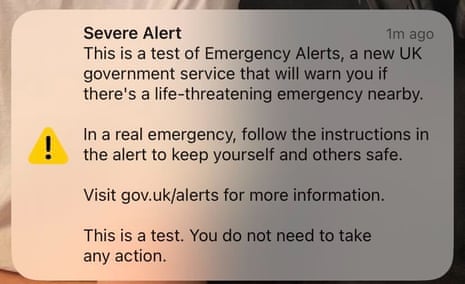Key events
Three certainly wasn’t expecting to not deliver the alert to large numbers of customers. Their social media accounts were giving users notice of the upcoming alerts just like everyone else:
On Sunday 23 April at 3pm, the UK Government will be testing their emergency alert systems. Your phone will make a loud siren sound, even if it’s on silent, and you’ll see a message appear on your screen 🧵 1/2 #emergencyalert pic.twitter.com/mRUdPRl00E
— Three UK (@ThreeUK) April 20, 2023
But the replies tell a different story, with hundreds of customers telling the network that their phone didn’t sound the alarm.
Two Three users in my house, didn’t get it. The o2 user did. What happened? Why didn’t we get it?
— chloe haynes (@chlobocop27) April 23, 2023
Sammy Gecsoyler
Emma, 30, a teaching assistant, was aware and ready for the alert. “My phone was ready but it didn’t come through but other people’s went off.”
She thinks it’s a good idea. “They’re trying to keep us safe. Alerts, in one form or another, have been around for hundreds of years, just in different ways.
“Now they’re just adapting to the present. Everybody has a phone.
“The world is a horrible place somedays and with everything going on around the world, you never know what might happen in the UK.”
Other reasons why you might not have received the alert:
But, for the vast vast vast majority of you, it sounds like the fault here lies with Three.
Some Three network customers report no alert
One common factor in missed alerts may be the Three network. In nearly every report I’ve had so far of users not receiving the alert, they’ve either been on Three or on one of the smaller networks which use Three for its infrastructure:
I didn’t receive it either I’m with ID mobile which I think uses the 3 network x
— Amanda💙 (@WestheadAmanda1) April 23, 2023
All the androids that failed to sound were on @ThreeUK so I wonder was it a phone issue or a mobile network issue @alexhern
— Andrew Page @[email protected] (@andrewjpage) April 23, 2023
I’m on three and didn’t get it either
— Alex Lo (@alexnianguo) April 23, 2023
@alexhern Looks like Three network failed their emergency alert test. I’m aware of 4 people on the Three network who did not receive the alert.
— Rebecca Gregory (@RebeccaFriday96) April 23, 2023
I can also add that in my own WhatsApp groups, two members didn’t get the alert, and both were on Three, and within the Guardian every person who has so far reported failing to get it uses Three. I’ve asked Three for comment.
For balance, one person on O2 has also reported failing to get the notification.
As with any national event like this, there’s room for some fun too
Reports that some phones did not receive alert
The alert arrived early for some, but for others, never came at all. David Mitchell and Tanni Grey-Thompson are among those who reported not receiving the notification, and I’ve heard from several others wondering why they were left out as well. One of the big questions for the government in analysing this test will be what caused some users not to receive a warning that was supposed to go out to everyone.
The alarm went off on my phone but not David’s. DOES THE GOVERNMENT WANT HIM DEAD? I always thought he might be a spy.
— Victoria Coren Mitchell (@VictoriaCoren) April 23, 2023
@alexhern multiple people I know did not receive the alert – including me! Do we know how widespread this is? Worried that I’ll be the last to know in case of a real emergency scenario….
— Hywel Sedgwick (@HywelSedgwick) April 23, 2023

Sammy Gecsoyler
Aside from a few confused passersby pulling out their phones, most shoppers in Westfield Stratford in East London were unphased by the emergency test sent to all 4G and 5G phones this afternoon.
In case you didn’t see it, or aren’t in the UK, here’s the alert that flashed up on (nearly) every phone in the nation.

Instant feedback appears to be focused on two main points: firstly, that the alert went off 30 seconds early, surprising even people like me who were expecting it; and secondly, that the alert signal was so unpleasant that no one wanted to actually read the notification, instead focusing entirely on working out how to stop the awful sound. So, a mixed success?
Test alert sounds
It went off early! Blimey, that was quite loud and unpleasant.
I’m actually quite excited. Are you excited?
It’s a bit odd that it’s taken this long for the UK to have a national alert system. The government was running trials across the country as early as 2013 to test the possibility of using public phone networks to send emergency messages at a local or regional scale. The first such trials, in North Yorkshire, Glasgow and Suffolk, were deemed a success.
“Responders remain very keen to see the implementation of a national mobile alert system,” a 2014 report into the trials concluded. “The system would be an effective way of getting people to take specific protective action during an emergency. Whilst a significant challenge, there was consensus that it was possible to issue alerts to the public within 15 minutes of a decision being made.”
Instead, nothing happened for almost a decade. Slow and steady, eh?

